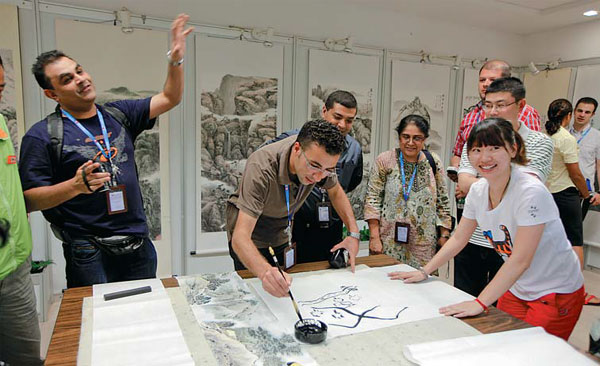A lesson in sharing experiences
Updated: 2012-06-26 04:24
By Tang Yue (China Daily)
|
||||||||
|
 |
|
Foreign officials attending seminars at the academy experiment with traditional Chinese painting at a community center in Shanghai. |
Feel the difference
Cadre training dates back to the founding of the CPC in 1921. The oldest training institution, the Party School of the Central Committee of CPC, has a history of more than 70 years. In the mid-1990s, the Chinese Academy of Governance was established. There are also three leadership academies: in Shanghai, in Jinggangshan in Jiangxi province, in Yan'an in Shaanxi province. They all have a different focus.
The academies in Jinggangshan and Yan'an concentrate on the CPC's "revolutionary tradition" and the current development of the nation.
Because of its location in one of the most developed regions of the country, CELAP's vision is to be "an international, contemporary and innovative leadership academy".
"About 12 percent of our current lecturers are from foreign countries," said Feng.
As there are both Chinese and foreign officials in the academy, he clearly felt the cultural differences between the two groups. "The Chinese officials seldom ask questions. Especially the high-ranking ones, who are reluctant to speak in public for fear of making mistakes. But foreigners are used to critical thinking and never hesitate to raise questions," he said.
In the Chinese program, the speaker at the opening ceremony and the class leader are always selected by the academy. However, it doesn't work that way in the international program. "They may ask ‘Why has he or she been chosen?' So we usually let them elect (the class leader and speaker). If we nominate one, we have to give a sound reason," said Zhu Li of CELAP's department of participant service. "Sometimes if I talk too much about a certain country during the discussions, some participants may complain their countries are not treated equally," added Zhu Yuan.
Accommodation is also very important, according to Feng. To make the participants feel at home, the academy not only provides an English-language TV channel in the rooms, but also a channel in the participant's mother tongue. "It is not only the curriculum that matters. The food, the city and the volunteers will all be a part of their impression of China. We have to show friendliness in every possible way," he said.
"Fortunately, cadres training has a long tradition in China and we know how to take good care of people."

 Relief reaches isolated village
Relief reaches isolated village
 Rainfall poses new threats to quake-hit region
Rainfall poses new threats to quake-hit region
 Funerals begin for Boston bombing victims
Funerals begin for Boston bombing victims
 Quake takeaway from China's Air Force
Quake takeaway from China's Air Force
 Obama celebrates young inventors at science fair
Obama celebrates young inventors at science fair
 Earth Day marked around the world
Earth Day marked around the world
 Volunteer team helping students find sense of normalcy
Volunteer team helping students find sense of normalcy
 Ethnic groups quick to join rescue efforts
Ethnic groups quick to join rescue efforts
Most Viewed
Editor's Picks

|

|

|

|

|

|
Today's Top News
Health new priority for quake zone
Xi meets US top military officer
Japan's boats driven out of Diaoyu
China mulls online shopping legislation
Bird flu death toll rises to 22
Putin appoints new ambassador to China
Japanese ships blocked from Diaoyu Islands
Inspired by Guan, more Chinese pick up golf
US Weekly

|

|







